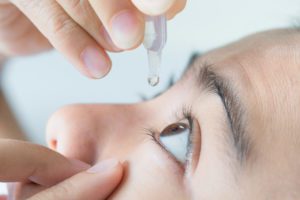Continued Under Eye Bruising Post Cataract Surgery
Recovery from cataract surgery generally takes about a month. You'll want to be very careful with your eye following cataract surgery.
Your ophthalmologist will provide you with clear, detailed instructions for the hours, days, and weeks after your cataract surgery.
General tips for post-cataract surgery care include:
- Avoid heavy lifting or strenuous exercise for a few weeks.
- Do not bend over for a couple days.
- Avoid swimming for the weeks following surgery.
- Protect your eye from irritants.
- Don't rub your eye.
Post-Cataract Surgery Recovery Timeline & Stages
Cataract surgery is most often an outpatient procedure, so you will be able to go home the same day your cataract is removed. This means that most of the recovery process will be at home, with some follow-up visits to your ophthalmologist to make sure your eye is healing properly. It is important to closely follow your ophthalmologist's guidelines for recovery, so you are at less risk of developing complications from the procedure, like inflammation, infection, swelling in the retina, detached retina or lens, pain, and vision loss.
Your ophthalmologist will give you a more detailed schedule of the recovery timeline and expectations, but here are some general recommendations to follow after cataract surgery.
Immediately After Surgery
Once cataract surgery has been completed, and your time in the recovery area has allowed any remaining anesthesia to clear, you can return home. Because your vision will be impacted immediately after surgery, it is not safe to drive yourself home. It is important that you have someone you trust take you back home after the procedure. While this is typically an outpatient operation, it is still an operation, and you may experience grogginess, discomfort, or pain for a few hours after the surgery. Normal side effects in the first day after surgery include:
-
- Watery eyes.
- Feeling like you have grit in your eyes.
- Blurry or double vision.
- A red or bloodshot eye.
You may receive medicated eye drops to treat the pain. You should also receive a pair of prescription sunglasses to protect your eyes from the glare of the sun or lights, and it is important to wear these for the length of time recommended by your ophthalmologist. To ensure the safety of your eyes overnight, you may also receive an eye patch or a protective visor to wear to bed so your eye is not hit or poked in your sleep.
A Few Days Later
You may still experience some physical discomfort in the eye that underwent cataract surgery, but these symptoms should begin to clear up within 24 to 48 hours after the procedure. You may be using medicated eye drops for several days after the procedure, which may require cleaning around the outside of your eye. Follow your eye doctor's instructions for this very closely to avoid getting anything, including sterile water, in your eye.
After you return home, you should be careful not to get soap and water directly into your eye for the period of time recommended by your ophthalmologist. Although you should be able to perform normal activities like showering within a day after this outpatient surgery, you may need to protect your eye while you bathe. You should also avoid many hair products, perfumes, face washes, lotions, and makeup for a few days while your eye heals. You may wear special eyeglasses for a few days after surgery to prevent you from poking, rubbing, or scratching your eye. Itching and discomfort are common for a few days after the procedure, but it is important to avoid touching your eye during this time.
After two to three days, this itching and discomfort will clear up. If it does not go away, or it gets worse, speak with your doctor. You may need to wear these glasses to correct your vision. Although your vision should become clearer within a day or so after surgery, you may need help seeing objects up close if you have a monofocal lens implanted because this lens will not correct for different ranges of sight.
While you can perform many basic activities the day after surgery, like watching television and moving around your house, more strenuous activities should be avoided. Your ophthalmologist will work with you to determine which aspects of your lifestyle are safe to perform, such as reading, up-close hobbies like sewing, driving, or physically strenuous activities like exercise. It is important to follow your ophthalmologist's advice closely because you are at risk of dislocating the new lens.
Typically, you will see your ophthalmologist a day or two after your surgery. You will likely still need help getting to and from your eye doctor's office. You will have another follow-up exam a week later. Then, you can spend a few weeks focusing on recovery before your next appointment.
Weeks Later
While you can expect considerable vision improvement in one to three days after surgery, it can take between three and ten weeks for your vision to improve as much as possible. Your final follow-up exam with your ophthalmologist should be about one month after your surgery. This is the full expected recovery time. With the exams before the one-month mark, your eye doctor should be able to catch any problems that come up after cataract surgery and treat these as needed.
Total healing time after cataract surgery is up to eight weeks, or two months. During this time, your vision should continue to improve. Colors may seem brighter, and your vision should be clearer overall. While you are not likely to recover perfect vision, or 20/20 vision, you are expected to have 20/30 or 20/40 vision without any corrective wear like glasses. Once your eyes have healed fully after cataract surgery, your doctor will give you your final glasses prescription. This is not likely to change because the artificial lens in your eye will not change shape or clarity over time, like a biological lens would.
If you have cataracts in both eyes that require surgery, your ophthalmologist will typically operate on one eye first, wait for the eye to recover, and then schedule the second surgery. While this lengthens your overall vision recovery time, it is important to allow for the adjustment period, so you can see out of one eye and know whether there may be complications during the healing process.
Recommendations for Care After Cataract Surgery
In the days and weeks after your surgery, it is recommended that you:
- Use prescription eye drops as detailed by your ophthalmologist.
- Follow all the recommendations of your ophthalmologist and/or eye surgeon.
- Rest and relax for two to three days.
- Use your eye shield every night for at least one week.
- Wear the eye shield while showering, especially if washing your hair.
- Perform normal, low-impact activities like using a computer, reading, or watching TV as normal.
- Avoid swimming during recovery for four to eight weeks.
It is important to avoid:
- Rubbing your eye.
- Getting foreign objects in your eye, like shampoo.
- Performing strenuous activities like running or yoga.
- Driving before getting the all-clear from your eye doctor.
- Flying without your doctor's knowledge and approval.
You can return to work a few days or weeks after the procedure, depending on what type of job you have.
Recovered Vision Is Likely After Cataract Surgery
It is important to follow your eye doctor's instructions for at-home, postoperative care. Attend all follow-up exams so your doctor can ensure your eye is healing properly. If you experience problems with your vision, ongoing or worsening discomfort or pain, swelling, or redness, or loss of vision, report these to your doctor immediately.
Because cataract surgery has been performed for decades, it has a high success rate and a low rate of complications. When you do undergo cataract surgery, the bulk of your recovery time will be at home, so it is important to understand exactly how to take care of yourself, which your ophthalmologist will make clear.
Frequently Asked Questions
-
Is cataract surgery painful?
Patients usually don't experience any pain during cataract surgery. Numbing drops are used beforehand, so you won't feel pain.
-
Do I need to have my cataract removed immediately?
Not necessarily. Doctors often monitor mild cataracts rather than removing them. Sometimes, a cataract will never develop to the point where it needs to be removed. Once it starts impacting vision, it is generally time to remove it.
-
Does insurance cover cataract surgery?
Most health insurance plans, including Medicare, will cover cataract surgery.
-
How long do I need to take off work?
Most people return to work within a day or two. You can return as soon as you feel comfortable to do so.
-
Can I drive myself home after cataract surgery?
No. You will be unable to drive, so you must have someone drive you home.

Financing Your Cataract Surgery
Typically, cataract surgery is covered by insurance and Medicare. However, in the event that your procedure is not fully covered, or if you elect to choose an upgraded lens option as part of your treatment plan, NVISION® offers financing options to ensure that you are not inhibited by cost. Read on to learn more about CareCredit® and see how cataract surgery can be affordable.
Learn More about Financing Your Cataract Surgery
References
Cataract Surgery. (March 22, 2018). Mayo Clinic.
Cataract Surgery Recovery. (October 2016). All About Vision.
Cataract Surgery. (November 9, 2018). American Academy of Ophthalmology (AAO).
Recovery: Cataract Surgery. (December 14, 2017). National Health Services (NHS).
Cataract Surgery: What to Expect at Home. (December 3, 2017). MyHealth.Alberta.ca.
The information provided on this page should not be used in place of information provided by a doctor or specialist. To learn more, read our Privacy Policy and Editorial Policy pages.
Source: https://www.nvisioncenters.com/cataracts/post-care/
0 Response to "Continued Under Eye Bruising Post Cataract Surgery"
Post a Comment